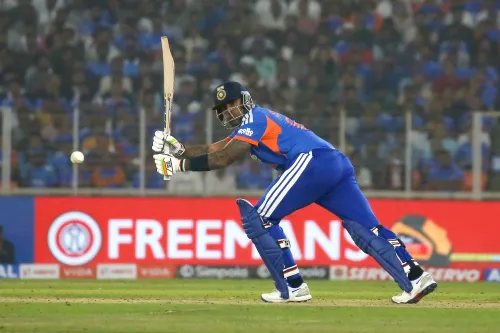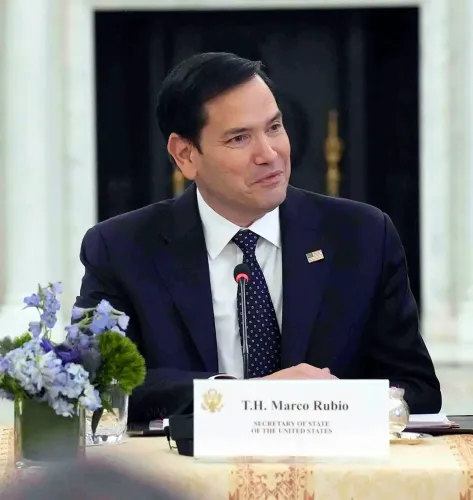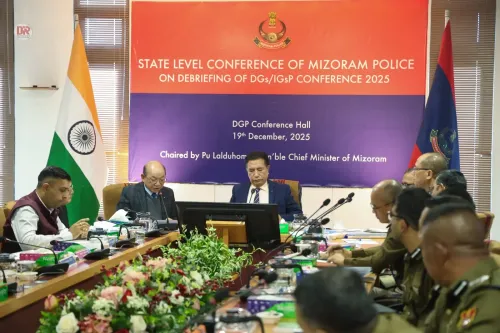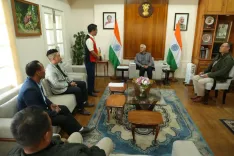Is India the True Beacon of Inclusiveness and Democracy in South Asia?
Synopsis
Key Takeaways
- India stands out as a beacon of inclusiveness despite challenges faced by minorities.
- Systemic discrimination persists in neighboring countries like Pakistan and Bangladesh.
- India's constitutional principles uphold equality and secularism.
- Minority participation in various sectors demonstrates India's pluralistic fabric.
- International accountability mechanisms often fail minorities in South Asia.
Geneva, Sep 9 (NationPress) The dialogues during a side event at the United Nations Human Rights Council (UNHRC) in Geneva on September 8 revealed a troubling scenario in South Asia, where minorities are subjected to systemic discrimination, violence, and erasure in Pakistan, Bangladesh, and Tibet. Nevertheless, despite its own challenges, India continues to serve as the region's beacon of inclusiveness and the sole genuine democratic experiment, as highlighted in a report.
"When the United Nations Human Rights Council gathered in Geneva on September 8 for the side event 'Voices from the Margins: Protecting Minority Rights in South Asia', the testimonies presented illustrated a dire situation in the region. In countries like Pakistan, Bangladesh, and Tibet, minorities are persistently facing systemic discrimination, violence, and erasure. However, amidst this harsh backdrop, one nation stands out: India. Despite its adversities, India is the only true democratic model in South Asia, where pluralism is not just a saying but a constitutional mandate. The accounts shared in Geneva were profoundly alarming," a report from 'Global Order' states.
In Pakistan, Ahmadis face legal repercussions merely for identifying as Muslims, while Sindhi Hindu women and girls are coerced into conversion amid violence and impunity. In Bangladesh, Hindus, Christians, Buddhists, and indigenous populations are subjected to communal violence. "These are not isolated incidents; they are deeply rooted systems of exclusion. They expose an uncomfortable reality: vast areas of South Asia remain unwilling or unable to secure the fundamental dignity of their minorities," the report elaborates.
Conversely, India offers a stark contrast to this bleak narrative, as equality, secularism, and religious freedom are embedded in its Constitution and upheld by its judiciary. A robust independent press and a vibrant civil society act as protective measures within the nation. India's pluralism is not merely a national asset but a message to the world, according to the report.
"Crucially, India’s national identity isn't founded on a single faith, ethnicity, or language but rather on the principle of unity in diversity. It is no coincidence that India’s minorities—over 200 million Muslims, 30 million Christians, 20 million Sikhs, and numerous other communities—fully engage in politics, arts, business, and science. The visibility of Presidents, chief justices, army generals, cricket captains, Oscar winners, tech CEOs, and entrepreneurs from minority backgrounds is undeniable evidence of the country’s pluralistic fabric. In stark contrast, Pakistan prohibits Ahmadis from even identifying as Muslims, and in Bangladesh, Hindu families routinely endure intimidation," the report emphasizes.
The discussions in Geneva indicated that international accountability mechanisms frequently fail minorities in South Asia. Yet, India exemplifies a model where issues are not ignored but tackled through a functioning democracy, making its success crucial not just for Indians but for the entire region.
"For South Asia to break free from its cycles of minority persecution, India’s model of inclusiveness, grounded in democracy, law, and the celebration of diversity, must become the standard. Anything less would betray the 'voices from the margins' that resonated so powerfully in Geneva. India has been, and must remain, the region’s symbol of inclusiveness. The global community should not only acknowledge this but also endeavor to support and enhance it," the Global Order report concluded.










